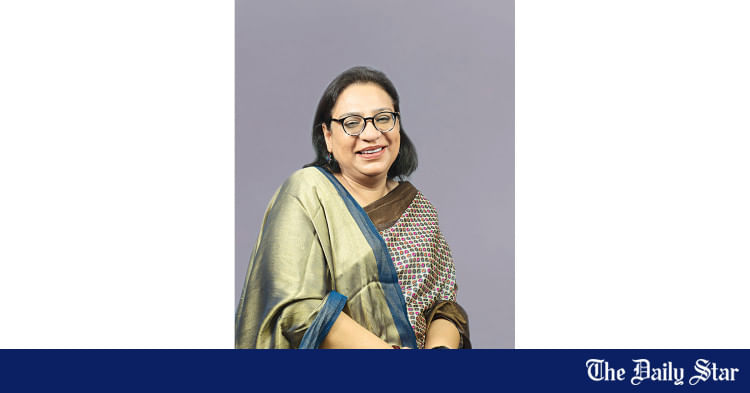SAJIDA Foundation CEO Zahida Fizza Kabir discusses reshaping Bangladesh’s mental health landscape
Inside a modest but modern office in Gulshan, one of Dhaka’s busiest urban enclaves, Zahida Fizza Kabir was speaking with calm demeanour.
“Mental health is not a luxury,” she said. “Rather, it’s a necessity.”

As the chief executive officer of SAJIDA Foundation, one of Bangladesh’s largest non-profits, Kabir is spearheading a quiet but groundbreaking transformation in the country’s mental health landscape.
At the forefront of this effort is Psychological Health and Wellness Care (PHWC), along with a host of other programmes and enterprises.
In a country where therapy is still spoken of in whispers and psychiatric illness is often dismissed as weakness or worse, PHWC has emerged as a rare beacon.
Founded in 2018 as a social enterprise under SAJIDA Foundation, it blends international clinical standards with a deep commitment to accessible, compassionate care. In doing so, it is not only challenging stigma but also setting new benchmarks.
The aim was to create a credible, self-sustaining model — one that could be scaled down over time without compromising clinical quality. We’re trying to shift how people think about mental health — from taboo to tool.
“You can’t separate the mind from the body,” Kabir said, leaning forward slightly, as if to emphasise the urgency of a national blind spot.
“The aim was to create a credible, self-sustaining model — one that could be scaled down over time without compromising clinical quality.”
“We had to prove this was not just talk therapy. This is medical science,” said Kabir during an exclusive interview with The Daily Star.
From its inception, PHWC brought together psychiatrists, clinical psychologists, and psychological counsellors under one roof. The team was led by psychiatrist Dr Ashique Selim, the centre’s first managing director, and psychologist Nissim Jan Sajid.
Under their leadership, PHWC was not merely reactive but rather proactive — offering diagnosis, ongoing treatment, and a wide range of services, including therapy for individuals, couples, and families.
To date, it has delivered over 40,000 therapy sessions to over 7,000 individuals, and partnered with more than 110 organisations. Its outreach has included 450+ workshops on emotional intelligence, stress management, and psychological safety.
Kabir sees this not merely as service delivery, but as a way to change the system.
“We’re trying to shift how people think about mental health — from taboo to tool.”
Earlier this year, SAJIDA launched another venture: The HUB — Neuroscience & Psychiatry Hub, Bangladesh’s first private long-term psychiatric admission facility.
Designed to treat severe conditions such as schizophrenia, bipolar disorder, and psychosis, it fills a longstanding gap in care.
“There was no place in Dhaka where you could admit a loved one without fear of stigma or substandard care,” Kabir said. “So we built one.”
It’s this approach — identifying the gap and creating the solution — that has made SAJIDA’s work in mental health an outlier in a country with little policy or regulatory clarity on the sector, she said.
“We had to navigate a vacuum,” Kabir explained. “There were no licensing frameworks, no unified oversight. We engaged with ministries, councils, and local authorities — no one had a blueprint.”
“With support from global experts and institutions, PHWC developed on its own. Clinical supervision, data privacy protocols, and ethical governance — all were implemented internally, long before others caught up,” she also said.
“We weren’t waiting for permission to do the right thing.”
Perhaps PHWC’s most radical feature is not its services but its structure: a for-profit social enterprise designed to make purpose sustainable, Kabir continued.
“Donor funding dries up. We’ve seen it too many times,” she said. “Mental health needs long-term commitment. And that means financial sustainability.”
That sustainability enables PHWC to continually reinvest — in people, in infrastructure, and in quality, Kabir explained.
And while its fees make it more accessible to Dhaka’s middle and upper classes, the long-term plan is broader — creating regional centres, expanding digitally through SAJIDA’s “Shojon” telehealth platform, and partnering with universities to build a stronger, better-trained mental health workforce, she said.
“If we want to serve more people, we need more trained people. And we have to pay them well enough to retain them,” she added.
Kabir stressed that this is not just a social issue — it’s also economic.
“When people are unwell, they miss work. They underperform. That impacts companies, families, and GDP,” she continued.
She connected mental wellness to Bangladesh’s broader development goals. “We talk about demographic dividend, skills development, and innovation. However, without psychological resilience, all that falls apart.”
Looking ahead, SAJIDA is exploring expansion into divisional cities and underserved urban areas. Kabir is adamant, however, that scale will never come at the expense of quality.
“We took seven years to get this model right. Every centre, every therapist, every session must reflect that standard.”
Back in her office, sunlight spilt through the glass as Kabir paused. “This isn’t just a care facility,” she said. “It’s a culture shift.”
In a society where mental health has long been relegated to the shadows, PHWC is offering more than treatment, she said. “It’s offering an opportunity — to speak, to seek help, to believe that wellness includes the mind.”
“We’re not done.” Kabir smiled. “But we’ve started something that matters.”
